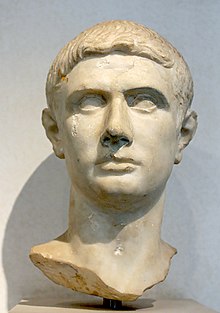Marcus Junius Brutus the Younger
| Marcus Junius Brutus the Younger | |
|---|---|

Marble bust of Brutus, at the Palazzo Massimo alle Terme in the National Museum of Rome
|
|
| Senator of the Roman Republic | |
|
In office 58 BC – 42 BC |
|
| Personal details | |
| Born | 85 BC Rome, Roman Republic |
| Died | 23 October 42 BC (aged 43) Philippi, Macedonia |
| Nationality | Roman |
| Occupation | Politician, jurist, military commander |
| Known for | Assassination of Julius Caesar |
| Religion | Roman Paganism, (Cultus Deorum Romanorum) |
Marcus Junius Brutus (/ˈbruːtəs/; 85 BC – 23 October 42 BC), often referred to as Brutus, was a politician of the late Roman Republic. After being adopted by his uncle he used the name Quintus Servilius Caepio Brutus, but eventually returned to using his original name. He took a leading role in the assassination of Julius Caesar.
Brutus was close to General Julius Caesar, the leader of the Populares faction. However, Caesar's attempts to assume greater power for himself put him at greater odds with the Roman elite and members of the Senate. Brutus eventually came to oppose Caesar and fought with the Optimate faction, led by Pompey the Great, against Caesar's forces in Caesar's Civil War. Pompey was defeated at the Battle of Pharsalus in 48 B.C., after which Brutus surrendered to Caesar, who granted him amnesty.
However, the underlying political tensions which led to the war had not been resolved. Due to Caesar's increasingly monarchical behavior, several senators, calling themselves "Liberators", plotted to assassinate him. They recruited Brutus, who took a leading role in the assassination, which was carried out successfully on March 15, 44 B.C. The Senate, at the request of the Consul Mark Antony, granted amnesty to the assassins. However, a populist uprising forced Brutus and his brother-in-law, fellow assassin Gaius Cassius Longinus, to leave the City of Rome. In 43 B.C., Caesar's grandnephew, Consul Gaius Octavian Caesar, immediately after taking office, passed a resolution declaring the conspirators, including Brutus, murderers. This led to the Liberators' civil war, pitting the erstwhile supporters of Caesar, under the Second Triumvirate, wishing both to gain power for themselves and avenge his death, against those who opposed him. Octavian combined his troops with those of Antony, and together they decisively defeated the outnumbered armies of Brutus and Cassius at the Battle of Philippi in October 42 B.C. After the battle, Brutus committed suicide.
...
Wikipedia
